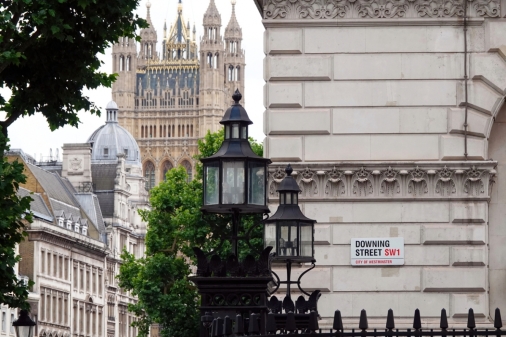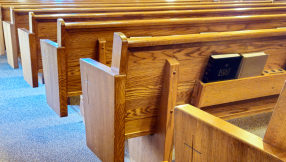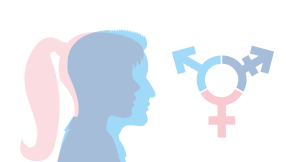
While the last British general election was just four and a half years ago, it seems to belong in another historical epoch. It's not just that we've had three prime ministers, a pandemic and a war in Europe since we last went to the ballot-box, it's the way our world has been buffeted by so many cultural, political and technological changes. So at this election time I'm writing two articles: this, sketching some key aspects of our times, and a second suggesting what we Christians should do about the election.
In these strange times let me point out the three current moods that have struck me.
First, there is a mood of disquiet. In fact, disquiet may be too mild, and you could replace it with danger. War rages on the borders of Europe, the rumbling volcano of the Middle East threatens to erupt, and China has aggressive imperial ambitions. Linked are serious threats to those vast invisible electronic networks on which every aspect of society now relies.
We might add to this most unpredictable brew of events both the unknown mystery of Artificial Intelligence and the increasingly real one of climate change. The sense of vulnerability and fragility is heightened by our traumatic memories of the Covid pandemic. Such anxiety was hardly eased when, on the day the election was announced, the Deputy Prime Minister encouraged every member of the British population to stock up on bottled water, emergency supplies and first aid! These are indeed times of disquiet.
Second, there is a mood of discord. Discord is 'a lack of agreement or an active quarrelling or conflict' and is an appropriate word for our times. Ugly disagreement, division and anger are thriving. There seems to be a growing discontent and division focusing on gaps, whether real or imagined, of culture, wealth, belief and behaviour.
Increasingly, I hear matters described in terms of 'us' and 'them' and with it a view of society that sees the nation in terms of tribes and clans than any sort of unity. With this discord comes an unwillingness or inability to seek consensus and a growing inclination to exchange calm, reasoned argument for derision and anger. Linked with this growing discord is a worrying tendency – all too easy in such troubled times – to hunt out scapegoats for blame and punishment.
Finally, there is a mood of disillusionment. One disturbing feature of the election campaign so far is the absence of idealism: I hear no courageous or stirring summons to any political dream or noble vision. Instead the parties seem to be focusing on the failings, alleged or authentic, of their opponents. Such a gaze down to the gutter rather than upwards to the stars is unappealing. This sense of disillusionment is heightened by insinuation – that politicians of every party lack principles, listen to more advisers rather than real people and seek to wield power not for the many, but for the few. This mood has resulted in a cynical electorate who will vote on the basis of who they distrust least.
Now having pointed to the gloomy skies of the national culture let me say that for Christians there are, amid the heavy clouds, bright rays of sunshine. The three moods that have struck me are in fact positions to which we Christians can respond in a positive way. Indeed, if you can forgive me for my irrepressible evangelistic outlook, I see opportunities for the gospel in them.
Let's turn to disquiet. While we must not dismiss the threats facing the world, we Christians know that a God of love and justice remains in overall control. We rest on such verses as Psalm 46:1-2 (NIV): 'God is our refuge and strength, an ever-present help in trouble. Therefore we will not fear, though the earth give way and the mountains fall into the heart of the sea.' We are God's people, safeguarded eternally by his solemn covenant to us through Jesus Christ. From the evangelistic point of view, one of the biggest barriers against faith among many people has long been the view that this world is not just their home, but a secure one. That's no longer an easy view to hold and with its loss comes great opportunities to point to the eternal security there is in Christ.
And as for division? Well, the Christian church strives for unity, the overcoming of barriers and ultimately about a new people of God coming from every race and culture. And against a great deal of opposition, both human and spiritual, it often achieves it. Although there are church splits and problems – tell me about them – this is an area where the church leads the world in upholding – and demonstrating – such endangered virtues as humility, grace and kindness. Indeed, there are many stories of non-believers who, having spent a working week battered by division, antagonism and hatred, have walked into a living, lively and loving church and wept at the unity they see and feel.
The mood of disillusionment is particularly intriguing. One of the biggest challenges the church has faced has been the idea that human beings can themselves make the world a better place. Political systems, whether of the left or the right, have long boasted that they can bring about a reign of peace, truth and justice on earth. Such hopes seem to have been eroded away today. In fact, if something is an illusion, then disillusionment is progress.
It's fascinating that this election comes when we are seeing many people turning to Christianity. Ultimately, disquiet, discord and disillusionment reflect the absence of three things: peace, grace and hope. All three are gifts of God through Christ. Let's point them to him!
Canon J.John is the Director of Philo Trust. Visit his website at www.canonjjohn.com or follow him on Facebook, Instagram or Twitter.













